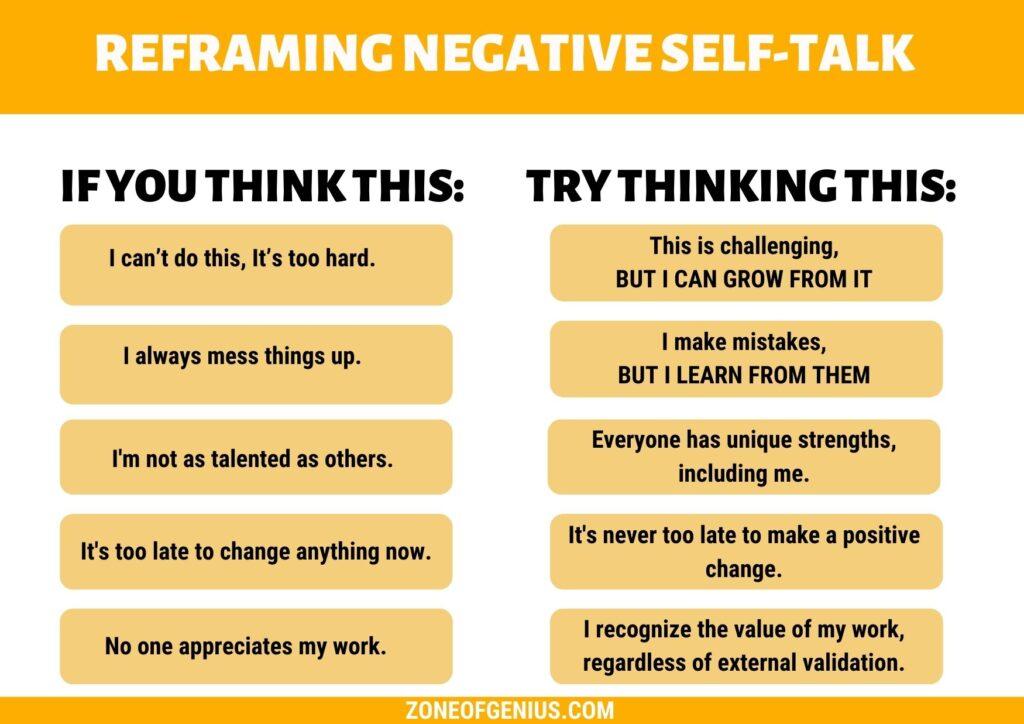As a small business owner, you are used to problem-solving and making important decisions. But what happens when that little voice inside your head second-guesses your every move? That voice is your inner critic voice, and it’s something that can impact not only your entrepreneurial success but also your mental health. It’s time to take control of this voice and harness it for positive change.
In this post, we’ll explore what your inner critic voice is, how to conquer it, and its impact on entrepreneurship.
What is an Inner Critic Voice?
Your inner critic voice is essentially the voice inside your head that tells you negatively. It tells you like “You’re not doing enough,” “You’re not good enough,” or “You’re just plain wrong.”
Small business owners face a persistent inner voice due to the risks and decisions that can impact their company. This voice becomes prominent as you navigate the challenges of running a business. However, that doesn’t mean that you have to let this voice control you.
How Does Your Inner Critic Voice Affect Your Entrepreneurship Success?
Your inner critic voice can be incredibly detrimental to your business’ success. This voice can lead you to the feeling of fear, doubt, and insecurity. These feelings can also prevent you from taking necessary risks, making important decisions, and ultimately achieving your goals. Let’s explore some of the things that can happen when you don’t overcome inner critics.
1. Increased Risk of Burnout
The critical inner voice increases the risk of burnout, pushing you to work longer hours and neglecting your well-being. You may also experience mental and physical exhaustion. This burnout not only affects personal health but also impairs focus, productivity, and effective leadership.
Related: How To Recover From Burnout
2. Lower Value in Your Business
Negative self-talk leads to undercharging for services, selling products below their value, and impeding effective marketing. This self-critical mindset limits growth potential and hinders a business’s overall success and competitiveness.
Related: Amazon AWS Exec Says Innovation is a Must for Business Success
3. Poor Decision-Making and Risk-Taking
The inner critic negatively influences decision-making and risk-taking. When you face uncertainty, you may also wrestle with self-doubt and overthinking, hindering decision-making. In turn, poor decisions and actions can distort reality and impede business success.
4. Hindered Innovation and Adaptability
The inner critic’s negative influence suppresses creativity and innovation. With this, it can cause you to second-guess ideas and avoid taking risks. Reluctance to embrace change interferes with a business’s adaptability to evolving markets, affecting its ability to stay competitive.
Related: Amazon AWS Exec Says Innovation is a Must for Business Success
5. Strained Interpersonal Relationships
Constant self-criticism can spill over into interpersonal interactions, creating a tense work environment. Under the influence of the inner critic, business owners may struggle to collaborate, communicate openly, and build positive relationships. This ultimately impacts the overall dynamics of the business.
How to Overcome Your Inner Critics
Define Your Inner Critics
Identify your inner critic as a blend of past expectations and external criticism. For instance, if you recall a former colleague’s negative feedback, acknowledge it but recognize it doesn’t define your abilities. Understand that separating the inner critic from your authentic self empowers you to challenge its influence.
Talk Back to the Inner Critic
Engage in positive self-talk to counteract negativity. When your inner critic whispers doubts, respond with affirmations like, “I can do this” or “I am stronger than I think.” By actively challenging these thoughts, you reshape your mindset and diminish the impact of past mistakes on your present decisions.
Remind Yourself of Your Accomplishments
Reflect on specific achievements in your entrepreneurial journey. For example, recall a time when your business positively impacted a customer or contributed to the community. By acknowledging these accomplishments, you reinforce your capabilities and shift focus away from the inner critic’s negativity.
Give Yourself a Break
Accept that everyone makes mistakes, and it’s part of the learning process. If a decision leads to an unfavorable outcome, such as hiring the wrong person, recognize it as a lesson rather than a failure. Take a moment for self-reflection, but don’t allow setbacks to diminish your resolve.
Overcome Self-Doubt and Procrastination
Break down your to-do list into smaller, manageable tasks. For instance, instead of overwhelming yourself with a lengthy list, focus on accomplishing one or two essential items. This approach builds confidence over time, allowing you to expand your goals based on proven capabilities gradually.
Show Sympathy Instead of Criticism
Shift your perspective from unchecked tasks to completed accomplishments. Consider unforeseen challenges you successfully navigated during the day. By recognizing your adaptability and problem-solving skills, you redirect your attention away from perceived failures.
Refuse To Compare Yourself to Others
Avoid comparing your business journey to others’. Instead, concentrate on your unique strengths and achievements. For example, resist the temptation to imitate a competitor’s strategy and focus on what sets your business apart. Stepping back from social media comparisons can also reduce feelings of inadequacy.
Be Kind to Yourself and Others
Practice kindness by allowing yourself mental health breaks. If you feel overwhelmed, take a day off or indulge in activities that bring joy. Extend the same kindness to others, fostering a positive environment that counteracts the inner critic’s negativity.
Persevere as a Business Owner
Navigate challenges with resilience and perseverance. Recall a specific instance where you faced uncertainty but emerged victorious. By acknowledging past triumphs, you build confidence, gradually silencing the inner critic and strengthening your ability to overcome future challenges.
Here’s an example graphic on how you can refrain from negative self-talk:

Final Thoughts
Conquering your inner critic is pivotal for entrepreneurial success. As a small business owner accustomed to navigating challenges, your internal dialogue can either propel you forward or become a hindrance. Learning how to overcome inner critics is essential, as it transforms potential obstacles into stepping stones for growth. Embrace this journey with resilience, and let your inner voice be a guide, not a barrier, to achieving your business aspirations.
The strategies outlined, from defining the inner critic to showing self-kindness, provide a roadmap for reclaiming mental space and fortifying your journey. By celebrating achievements, reframing setbacks as lessons, and fostering self-compassion, you not only silence the inner critic but also cultivate an environment conducive to success.
Remember, as a business owner, you are not immune to self-doubt, but perseverance and resilience are your greatest allies. Embrace your unique journey, learn from past experiences, and let each triumph be a testament to your capability. By conquering your inner critic, you unlock the potential for growth, innovation, and a fulfilling entrepreneurial venture.
Share your struggles and successes in your business journey by leaving a comment below.
Related Article:
Navigating Entrepreneurship: Insights and Wisdom from Brian Hess











